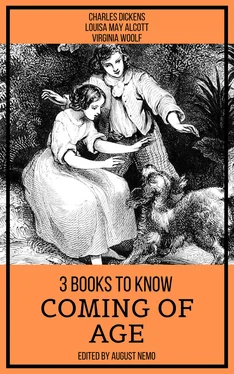"I am expected, I believe?"
"Burn me twice over, if I can say!" said he.
Upon that, I turned down the long passage which I had first trodden in my thick boots, and he made his bell sound. At the end of the passage, while the bell was still reverberating, I found Sarah Pocket: who appeared to have now become constitutionally green and yellow by reason of me.
"Oh!" said she. "You, is it, Mr. Pip?"
"It is, Miss Pocket. I am glad to tell you that Mr. Pocket and family are all well."
"Are they any wiser?" said Sarah, with a dismal shake of the head; "they had better be wiser, than well. Ah, Matthew, Matthew! You know your way, sir?"
Tolerably, for I had gone up the staircase in the dark, many a time. I ascended it now, in lighter boots than of yore, and tapped in my old way at the door of Miss Havisham's room. "Pip's rap," I heard her say, immediately; "come in, Pip."
She was in her chair near the old table, in the old dress, with her two hands crossed on her stick, her chin resting on them, and her eyes on the fire. Sitting near her, with the white shoe that had never been worn, in her hand, and her head bent as she looked at it, was an elegant lady whom I had never seen.
"Come in, Pip," Miss Havisham continued to mutter, without looking round or up; "come in, Pip, how do you do, Pip? so you kiss my hand as if I were a queen, eh? Well?"
She looked up at me suddenly, only moving her eyes, and repeated in a grimly playful manner:
"Well?"
"I heard, Miss Havisham," said I, rather at a loss, "that you were so kind as to wish me to come and see you, and I came directly."
"Well?"
The lady whom I had never seen before, lifted up her eyes and looked archly at me, and then I saw that the eyes were Estella's eyes. But she was so much changed, was so much more beautiful, so much more womanly, in all things winning admiration had made such wonderful advance, that I seemed to have made none. I fancied, as I looked at her, that I slipped hopelessly back into the coarse and common boy again. O the sense of distance and disparity that came upon me, and the inaccessibility that came about her!
She gave me her hand. I stammered something about the pleasure I felt in seeing her again, and about my having looked forward to it for a long, long time.
"Do you find her much changed, Pip?" asked Miss Havisham, with her greedy look, and striking her stick upon a chair that stood between them, as a sign to me to sit down there.
"When I came in, Miss Havisham, I thought there was nothing of Estella in the face or figure; but now it all settles down so curiously into the old—"
"What? You are not going to say into the old Estella?" Miss Havisham interrupted. "She was proud and insulting, and you wanted to go away from her. Don't you remember?"
I said confusedly that that was long ago, and that I knew no better then, and the like. Estella smiled with perfect composure, and said she had no doubt of my having been quite right, and of her having been very disagreeable.
"Is he changed?" Miss Havisham asked her.
"Very much," said Estella, looking at me.
"Less coarse and common?" said Miss Havisham, playing with Estella's hair.
Estella laughed, and looked at the shoe in her hand, and laughed again, and looked at me, and put the shoe down. She treated me as a boy still, but she lured me on.
We sat in the dreamy room among the old strange influences which had so wrought upon me, and I learnt that she had but just come home from France, and that she was going to London. Proud and wilful as of old, she had brought those qualities into such subjection to her beauty that it was impossible and out of nature—or I thought so—to separate them from her beauty. Truly it was impossible to dissociate her presence from all those wretched hankerings after money and gentility that had disturbed my boyhood—from all those ill-regulated aspirations that had first made me ashamed of home and Joe—from all those visions that had raised her face in the glowing fire, struck it out of the iron on the anvil, extracted it from the darkness of night to look in at the wooden window of the forge and flit away. In a word, it was impossible for me to separate her, in the past or in the present, from the innermost life of my life.
It was settled that I should stay there all the rest of the day, and return to the hotel at night, and to London to-morrow. When we had conversed for a while, Miss Havisham sent us two out to walk in the neglected garden: on our coming in by-and-by, she said, I should wheel her about a little as in times of yore.
So, Estella and I went out into the garden by the gate through which I had strayed to my encounter with the pale young gentleman, now Herbert; I, trembling in spirit and worshipping the very hem of her dress; she, quite composed and most decidedly not worshipping the hem of mine. As we drew near to the place of encounter, she stopped and said:
"I must have been a singular little creature to hide and see that fight that day: but I did, and I enjoyed it very much."
"You rewarded me very much."
"Did I?" she replied, in an incidental and forgetful way. "I remember I entertained a great objection to your adversary, because I took it ill that he should be brought here to pester me with his company."
"He and I are great friends now."
"Are you? I think I recollect though, that you read with his father?"
"Yes."
I made the admission with reluctance, for it seemed to have a boyish look, and she already treated me more than enough like a boy.
"Since your change of fortune and prospects, you have changed your companions," said Estella.
"Naturally," said I.
"And necessarily," she added, in a haughty tone; "what was fit company for you once, would be quite unfit company for you now."
In my conscience, I doubt very much whether I had any lingering intention left, of going to see Joe; but if I had, this observation put it to flight.
"You had no idea of your impending good fortune, in those times?" said Estella, with a slight wave of her hand, signifying in the fighting times.
"Not the least."
The air of completeness and superiority with which she walked at my side, and the air of youthfulness and submission with which I walked at hers, made a contrast that I strongly felt. It would have rankled in me more than it did, if I had not regarded myself as eliciting it by being so set apart for her and assigned to her.
The garden was too overgrown and rank for walking in with ease, and after we had made the round of it twice or thrice, we came out again into the brewery yard. I showed her to a nicety where I had seen her walking on the casks, that first old day, and she said, with a cold and careless look in that direction, "Did I?" I reminded her where she had come out of the house and given me my meat and drink, and she said, "I don't remember." "Not remember that you made me cry?" said I. "No," said she, and shook her head and looked about her. I verily believe that her not remembering and not minding in the least, made me cry again, inwardly—and that is the sharpest crying of all.
"You must know," said Estella, condescending to me as a brilliant and beautiful woman might, "that I have no heart—if that has anything to do with my memory."
I got through some jargon to the effect that I took the liberty of doubting that. That I knew better. That there could be no such beauty without it.
"Oh! I have a heart to be stabbed in or shot in, I have no doubt," said Estella, "and, of course, if it ceased to beat I should cease to be. But you know what I mean. I have no softness there, no—sympathy—sentiment—nonsense."
What was it that was borne in upon my mind when she stood still and looked attentively at me? Anything that I had seen in Miss Havisham? No. In some of her looks and gestures there was that tinge of resemblance to Miss Havisham which may often be noticed to have been acquired by children, from grown person with whom they have been much associated and secluded, and which, when childhood is passed, will produce a remarkable occasional likeness of expression between faces that are otherwise quite different. And yet I could not trace this to Miss Havisham. I looked again, and though she was still looking at me, the suggestion was gone.
Читать дальше












